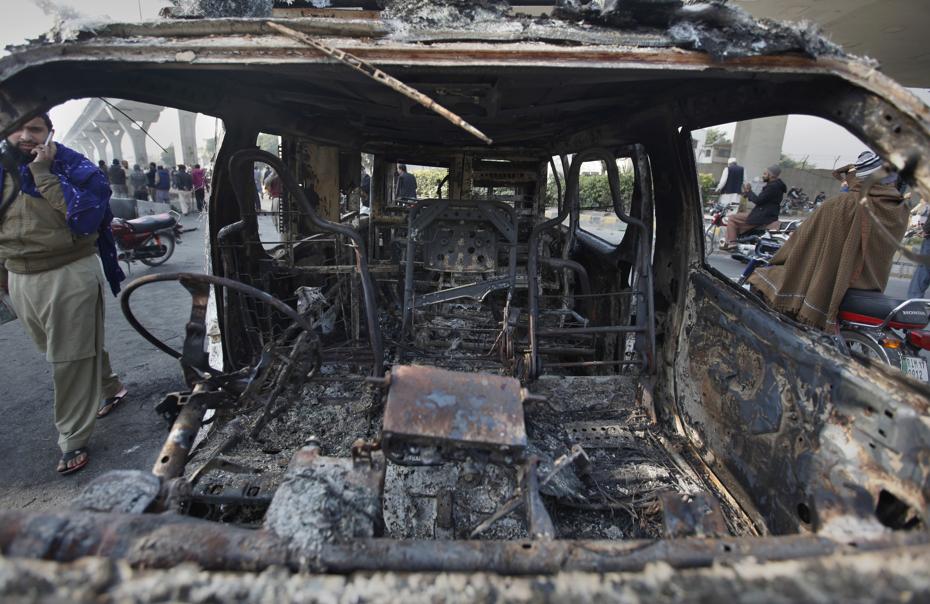
ISLAMABAD — Pakistan deployed army troops in Islamabad on Sunday to help restore order to the capital, officials said, a day after violent clashes between Islamist protesters and police left at least six people dead and 200 others injured.
The move came after Prime Minister Shahid Khaqan Abbasi and army officials held emergency talks and agreed to send troops to protect vital areas and buildings such as Parliament, Abbasi’s residence, and the enclave that houses embassies.
But the military told the governing party, Pakistan Muslim League-Nawaz, that it would rule out the use of lethal force to quell the protest.
More than 3,000 protesters gathered Sunday at the Faizabad Intersection, the focus of the protest. That site links Islamabad with the garrison city of Rawalpindi, the Associated Press reported.
Some of the demonstrators, angry over the police’s show of force the previous day, torched a car, three motorcycles, and a guard post near the rally site, the AP said. No casualties were reported.
A military spokesman, General Asif Ghafoor, said the army chief, General Qamar Javed Bajwa, urged Abbasi on Saturday “to handle the protest peacefully, avoiding violence from both sides as it is not in the national interest.’’
Another military official confirmed Sunday: “The army will remain at the backstage. We will not use force against the protesters. We will just protect important government installations.’’
The official insisted on anonymity because he was not authorized to speak to the media about the protest, which has presented a potentially major crisis for the governing party.
The Islamabad high court ordered the government last week to clear the interchange, but on Saturday, nearly 8,000 police officers and members of a paramilitary force failed to remove the protesters. Both sides attacked each other with sticks, officers fired tear gas and rubber bullets, and tents were burned. Police later suspended the operation.
The latest spasm of violence raised concerns about the stability of the government. The governing party is already weakened from the disqualification of its leader, Nawaz Sharif, in July.
The protest stems from a proposed shift in the language of an oath lawmakers take before they enter office.
Khadim Hussain Rizvi, the cleric and leader of the Tehreek-e-Labaik Pakistan party, had accused Zahid Hamid, the law minister, of committing blasphemy after the governing party’s new version changed a declaration of Mohammed as God’s final prophet.
They demanded his resignation, but the government refused.
The law minister denied the blasphemy charge, even releasing a video in which he emphatically stated that he believed that Muhammad was God’s final prophet. The government also reversed the changes in the oath. But the efforts failed to placate Rizvi and several other religious leaders.
Blasphemy remains highly controversial in Pakistan, often leading to violence and mob justice. In recent years, hard-line Islamists have killed two prominent politicians who advocated changes in the country’s laws.
At the protest site, Rizvi rallied his supporters from atop a trailer, shouting through a microphone and accusing authorities of working on behalf of the United States. “Trump says change Pakistan’s blasphemy laws. Are you acting on his orders?’’ he asked the police.
On Saturday, protesters stormed the home of Hamid, in Pasrur in Sialkot district. He was not there. On Sunday, pressure grew for him to step down. Imran Khan, leader of Pakistan Tehreek-e-Insaf, called for his resignation.
Rizvi, who belongs to the Barelvi sect and built his reputation as a staunch defender of the country’s blasphemy laws, was a virtual unknown a few years ago. He has since gained considerable political clout. His sermons have been filled with invectives against religious minorities and opponents.
In September, Rizvi’s party entered a by-election in Lahore, in eastern Pakistan, for the seat vacated after the ouster of Sharif. To the surprise of many observers, it won more than 7,000 votes, or 6 percent.
The relatively strong showing appears to have emboldened Rizvi, and he used the controversy over the electoral oath to pressure the government, unleashing supporters on the capital, where they’ve camped out for weeks, crippling traffic.
On Sunday, the aftermath of the clashes was visible in the charred grass on the sidewalks and burned tents. Boxes of food and plastic bottles of water were scattered on the ground.
Supporters of Rizvi roamed about the Faizabad Interchange with an air of victory.
That protesters had managed to repulse the advance of the police forces appeared to have emboldened them. Protest leaders have stepped up their demands, calling for the entire Cabinet to resign.
“Government used all kinds of force and thousands of personnel, but by the grace of Allah, they ran like rats when the believers of the prophet Mohammed retaliated,’’ one protester, Muhammad Zubair, said.
Abid Hussain, a seminary leader, who was leading a group of around 100 protesters, said, “We will avenge the martyrdom of our six fellows by continuing the protest.’’



